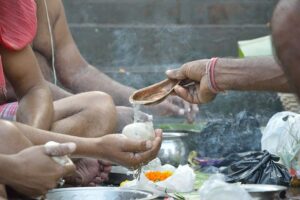Asthi Visarjan is a significant Hindu ritual performed after the cremation of a deceased person. It involves immersing the ashes (Asthi) of the departed soul in a holy river, symbolizing their final journey toward liberation (Moksha). This ritual is deeply rooted in Hindu beliefs and traditions, ensuring peace for the soul in the afterlife.
Spiritual Significance of Asthi Visarjan
According to Hindu scriptures, the human body is made of five elements—earth, water, fire, air, and space. Cremation returns the body to nature, and immersing the ashes in sacred waters helps the soul attain salvation. Rivers like the Ganga, Yamuna, Narmada, and Godavari are considered highly auspicious for this ritual.
When and Where to Perform Asthi Visarjan?
Asthi Visarjan should ideally be performed within 10 days of cremation, but it can also be done later with proper rituals. Some of the most revered locations for this ceremony include:
- Varanasi (Ganga River) – The holiest place for Asthi Visarjan.
- Haridwar (Har Ki Pauri) – A sacred spot where it is believed that immersion ensures Moksha.
- Prayagraj (Triveni Sangam) – The confluence of the Ganga, Yamuna, and Saraswati.
- Gaya (Falgu River) – A place where performing last rites brings peace to ancestors.
Rituals and Procedure of Asthi Visarjan
- Collection of Asthi (Ashes & Bone Fragments) – After cremation, the ashes are collected in an urn.
- Travel to a Holy River – The family takes the ashes to a sacred riverbank.
- Puja and Prayers – A priest performs rituals, chanting mantras and offering prayers for the departed soul.
- Immersion of Ashes – The ashes are gently poured into the flowing river, ensuring the final release of the soul.
- Donation & Feeding the Poor – Many families perform charity and offer food to Brahmins as part of the ritual.
Scientific and Environmental Aspects
While Asthi Visarjan is a deeply spiritual practice, it is essential to follow eco-friendly methods. Some modern initiatives promote bio-degradable urns and controlled immersion to prevent river pollution. Authorities in cities like Varanasi and Haridwar have introduced special zones to conduct the ritual without harming the environment.









